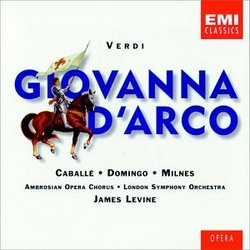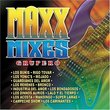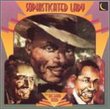| All Artists: Montserrat Caballé, Plácido Domingo, Sherrill Milnes, Robert Lloyd, Keith Erwen Title: Verdi - Giovanna d'Arco (Joan of Arc)/ Caballé · Domingo · Milnes · LSO · Levine Members Wishing: 0 Total Copies: 0 Label: EMI Classics Release Date: 5/7/1990 Genre: Classical Style: Opera & Classical Vocal Number of Discs: 2 SwapaCD Credits: 2 UPCs: 077776322629, 077776322650 |
Search - Montserrat Caballé, Plácido Domingo, Sherrill Milnes :: Verdi - Giovanna d'Arco (Joan of Arc)/ Caballé · Domingo · Milnes · LSO · Levine
 | Montserrat Caballé, Plácido Domingo, Sherrill Milnes Verdi - Giovanna d'Arco (Joan of Arc)/ Caballé · Domingo · Milnes · LSO · Levine Genre: Classical
|
Larger Image |
CD DetailsSimilar CDs
|
CD ReviewsThrilling account of early Verdi show-stopper Matteo | Oakland, CA United States | 06/19/2001 (4 out of 5 stars) "Wow! Kudos all the way around for this simply exhilirating recording of Verdi's "Giovanna d'Arco". The opera itself is an example of Verdi finding his feet as a composer, but there are wonderful hints of the masterpieces that were still in his future tucked into this generally effective score. Here, Verdi excels at suggesting the martial nature of the subject matter in the music and providing some of the most blood-pumping orchestral and choral passages I can remember. While the arias are not yet in realm of mature Verdi (mainly due to the remnants of the bel canto "oom-pah-pah, oom-pah-pah" aria style) there is enough vocal fireworks all the way around.And the singers do not disappoint. Leading the charge is Montserrat Caballe at her glittering best. This is easily one of her best recordings, and she is practically perfect, with a shimmering upper register (wonderfully converying Joan's youth), a sure, strong vibrato, and flawless coloratura. Superb!Domingo is also up to the challenge of Carlo, making "Giovanna" one of the best of his early recordings. His tenor is rich, strong, and able to hit the stratosphere with sureness. The other male voice is the excellent Sherill Milnes, who again proves himself to be one of the best baritones in the Verdi/Puccini repertoire.The London Symphony Orchestra and Ambrosian Opera Chorus are splendid and led by James Levine with such infectious vigor and propulsive excitement that it makes opera as thrilling and passionate as it should be. Levine takes what could have been a turgid affair and makes it anything but. While the quieter passages are allowed their space, and are rendered beautifully, it is in the rousing, energetic passages where the recording succeeds most.Yes, it's early Verdi, so it's not for everyone, but for fans of the singers or the composer, it's worth a listen!" Good music. Libretto by baboons L. E. Cantrell | Vancouver, British Columbia Canada | 11/24/2005 (5 out of 5 stars) "SOURCE: Analog studio recording from 1973, digitally remastered in 1998. CASR: Giovanna d'Arco - Montserrat Caballe Carlo VII, Re di Francia - Placido Domingo Giacomo d'Arco - Sherrill Milnes Lord Talbot - Robert Lloyd Dilil - Keith Erwen. CONDUCTOR: James Levine, with the London Symphony Orchestra and the Ambrosian Opera Chorus. FORMAT: Disk 1: Prologue and Act I, 71:22. Disk 2: Acts II and III, 49:28. DOCUMENTATION: Libretto in Italian, French, German and English. Brief and perfunctory history of the opera. Track listing with timings. COMMENTARY: "Giovanna d'Arco" was Verdi's seventh opera. In the years that followed his huge success with "Nabucco," Verdi wrote to the order of impresarios and publishers--and he did it primarily for the money. Later in life, he came to loathe this period and the working conditions imposed on him. He described it as his "years in the galley." Even so, he managed to grind out more good operas than clunkers. "Giovanna d'Arco" was one of the more successful. It was produced between "I due Foscari" and "Alzira," two of the clunkers. Verdi was writing on tight schedules and setting librettos churned out by writers whom it is overpraising to call hacks. If ever a libretto was written by baboons, it was this one. I'm not sure whether the baboon-in-chief was Schiller, on whose play "Die Jungfrau von Orleans" it was loosely based, or Temistocle Solera, who cast it into Italian doggerel. There is certainly blame enough to share. Verdi, a hard-headed and canny peasant from Busetto, could count "Giovanna" as a success as measured by that most objective of judges, the box office. Its financial success in Italy and elsewhere was due solely to Verdi's music. Even in its first run, the libretto of "Giovanna D'Arco" was a problem. It blatantly contradicted both the facts and the popular legend of the young woman who always called herself Jehanne la pucelle (Joan the Maiden). In the opera, Giovanna encounters the despairing Charles VII of France, bucks him up and sets off to drive back English invaders. Having won great successes on the battlefield, Giovanna is rapturously acclaimed by the French. Charles, of course, has fallen for the warrior-girl. He offers his love. The English, having lost Orleans, are in disarray. Up pops Giovanna's beloved father, who has convinced himself that his daughter has sold herself to the devil to win the love of the king. In an aria, "Franco son io," that surely would have earned a seal of approval from the Vichy government, Giacomo tells the English invaders that he is a patriotic Frenchman who would die for his country and its honor, therefore he has come to betray his country, his king and his daughter to them. Later, he publicly advises his little girl to purge her soul of sin by allowing herself to be burnt at the stake. The people of France turn on Giovanna, thinking that her old Pa must surely have some inside dope. In the last act of the opera, Giovanna is a prisoner in the English camp, chained to a rock, awaiting her fate. Her father, that patriotic Frenchman, happens to be strolling around in enemy territory and he overhears her prayers. Moved by her obvious piety, he decides that he has made a mistake. He releases her. She rides off into yet another battle. She is successful but mortally wounded. She expires in the finale, to the grief of all--excepting the local troop of frustrated devils, of course--especially of the king and her dear old Dad. If you manage somehow to push aside the idea that it is supposed to have something to do with the historical Joan of Arc, "Giovanna" is a highly enjoyable pot-boiler, full of crackling good tunes and rousing, lively choruses. Even a gang of devils has its own charming little dance tune. When he wrote "Giovanna," Verdi was still adhering to traditional operatic forms and walking in the well-trodden paths of Donizetti and Bellini. Already, though, he had replaced their elaborately decorated melodies with a raw power unknown to the older masters. In his years in the galley, Verdi developed the tools of greatness but he still awaited a librettist who would provide him with characters into whom he could breathe life, a Rigoletto, a Violetta or an Azucena. This recording, to the best of my knowledge, is the only one currently available that offers more or less modern sound. Caballe, Domingo and Milnes are all justly acclaimed singers and all are in good voice. James Levine's hard-charging conducting is appropriate for the opera. The orchestra and the chorus are excellent. These things fully justify a five-star rating. That said, I feel obliged to point out that Caballe, with all her undoubted and splendid virtues, just isn't a Joan of Arc. There is not a thing in her lovely voice to make men imitate the action of the tiger, to stiffen the sinews, summon up the blood, to disguise fair nature with hard-favour'd rage. And Domingo--wonderful voice, tremendous singer, no doubt about it--but he's not very apt to get at the heart and soul of a character. He's an amiable, one-size-fits-all sort of guy. Amazon has two other sets of "Giovanna d'Arco." Both offer sound quality that is inadequate. (Audiophiles would more likely say they are abominable.) Both star Renata Tebaldi, who is a Joan of Arc to the very core. Tebaldi performed the part many times in the early days of her career. Her Giovanna is all down-and-dirty, big-time Italian diva singing. Even for Tebaldi, it is impressive. Read the other Amazon reviews and you will find that even those who rate this opera highly, tend to do so with an implied ho-hum. Tebaldi shows why there were likely to be riots in the streets of Austrian-occupied Italy after a performance! On one of the recordings, Tebaldi is teamed with the young Carlo Bergonzi, who had just moved up from baritone to tenor. There is still a baritonal darkness in his voice, but all the ring and power that anyone could want. On the other set, Tebaldi's Carlo VII is the sadly under-recorded Gino Penno. Neither tenor needs to take a back seat to Domingo in sound and both offer far more impressive characterizations. By all means purchase this fine 1973 recording, but make an inexpensive investment in Tebaldi's Giovanna as a second set to discover what the opera is all about." A Great Recording! DvdW | The Netherlands | 08/24/2001 (4 out of 5 stars) "For an early Verdi opera this is one of my favourites - mainly due to the exceptional singing of Caballe, Domingo and Milnes. Excellent!"
|

 Track Listings (22) - Disc #1
Track Listings (22) - Disc #1

